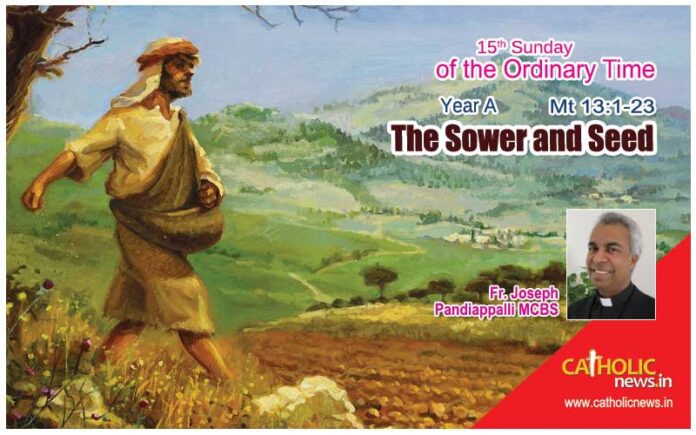
Every day Jesus spoke to many known and unknown people, told them about various topics of the kingdom of God in parables and took part in the lives of many people.
Jesus spoke through parables. That was immediately understandable for the people. Therefore the audience of Jesus could attend to the preaching of Jesus as a narration. People liked to come to Jesus and listen to his preaching. For the parables, Jesus used examples, images and symbols from everyday life in Palestine.
He gave them advices, sometimes a warning, or even a praise or he criticised them. The people were enthusiastic, but they did not always understand Jesus’ thoughts and words.
Jesus speaks about the word of God in an agricultural context, which his listeners at that time and we can understand well today.
Most of us know that without agriculture, without creating good conditions for the crops to grow, we could not reap anything.
Anyone who is involved in planting vegetables or grains knows how carefully you have to take care of preparing and caring for the soil so that the seeds grow and bear fruit. It is the same with the word of God that we read in the Bible, hear in church services or that is placed in our hearts by the media or fellow human beings.
Those listening to Jesus were very happy to hear, because among them were many farmers who were familiar with sowing and harvesting and the others experienced it more closely. The parables are about bearing fruit. The sower rejoiced at the hundredfold, or sixtyfold, or thirtyfold fruit.
Those listening to Jesus, like us today’s listeners, did not understand the meaning of the parable. Jesus can speak to us very clearly and interestingly with parables and convey his message to us. Jesus does not normally give an explanation of his parables. The listeners should find the explanation themselves or the parables are used so that different listeners made their own corresponding explanations. Sometimes Jesus explained and interpreted his parables. Jesus explained and interpreted the parable of sower and seed that we heard today as his audience wished to hear from Jesus an interpretation of it.
This parable is about the kingdom of God, as are other parables. Grains are the word of God, fields are we people, sower is God. Four different soils like the way, rocky soil, thorny soil and good soil are four different types of people who respond in different ways to the Word of God. By proclaiming the importance of good soil for good fruit, Jesus invites his hearers to take the word of God and live according to it.
Everyone is supposed to receive the word of God. The seed that fell on the road and withered are people who hear the word of God but do not want to understand it. Many other things are more important for them and the overestimate themselves. Here Jesus wants to mention different influences that hinder to hear the word of God which he designate as the evil.
With the seeds that fell on the rocky soil Jesus refers to people who receive the word of God with joy, but when they face difficulties they leave the message of God because their faith is not deep. Jesus reminded that In oder to remain steadfast in faith we need a strong faith. The seed fell under thron are people who do not succeed in following the word of God when they face different problems, needs and anxieties of dailey life.
The seeds fell on the good soil are people who hear and understand the word of God and bring the result, hundredfold, sixtyfold and thirtyfold.
Now I would like to ask another question that may be more important for us to take up and implement the message of today’s parable. How can I hear the Word of God today and bring fruit from the Word of God? It certainly doesn’t mean reading everything from the Bible and putting everything into practice literally. Even the interpretation of the texts has varied from time to time and has been understood differently by different people in different times and places. Interpretation of the Word of God by other people through speeches, discussions and scriptures are not a hundred percent pointers for an accurate road map for a fruitful life for me either. Jesus himself gives us indications that we can absorb the word of God and implement the message of the parable fruitfully. In his interpretation, Jesus spoke about the heart of man. The grains have been sown in the hearts of men, says Jesus. Jesus expresses his disappointment at the hardened hearts of the people and at the closed eyes of the people. At the same time, he praises his listeners, saying that his listeners’ ears hear and his listeners’ eyes see. What is necessary for receiving the word of God and for the yielding of the fruit is an open and good heart.
In people who have an open and good heart, the Word of God will bear a hundredfold fruit. An open and good heart moves people to think beyond all narrow and strict lines and to deal generously and more meaningfully with topics, problems, situations and laws. God the Father is merciful, kind and very generous. Our relationship with God and His Word sown in our hearts helps us to live generously and kindly in everyday life. This will be a gospel life that anyone can achieve without any exception. The Word of God that is sown in our hearts and the Spirit of God that lives in every person make us, as generous people, sons and daughters of God. Then there is the freedom of the children of God, where we think, act and act beyond laws, rules, prohibitions and guidelines and thereby bring peace and joy to everyday life. Amen
Fr. Joseph Pandiappallil MCBS



